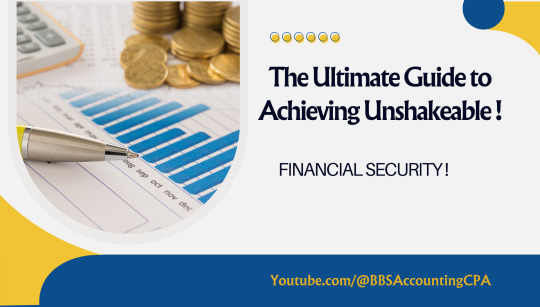#MoneySmart
Explore tagged Tumblr posts
Text
Mastering Your Finances: A Step-by-Step Guide on How to Create a Budget

Creating a budget is a foundational step towards achieving financial stability and realizing your financial goals. Whether you’re aiming to save for a major purchase, pay off debt, or simply gain better control over your finances, a well-crafted budget is an invaluable tool. This comprehensive guide will take you through the essential steps on how to create a budget, empowering you to make informed financial decisions and secure a more secure financial future.
How to Create a Budget?
1. Set Clear Financial Goals
Before diving into the budgeting process, define your financial goals. Whether it’s building an emergency fund, saving for a vacation, or paying off student loans, having specific and measurable goals will guide your budgeting decisions.
2. Gather Financial Information
Collect information about your income, expenses, and debts. Compile pay stubs, bank statements, bills, and any other relevant financial documents. This step provides a comprehensive overview of your financial situation.
3. Categorize Your Expenses
Divide your expenses into fixed and variable categories. Fixed expenses, such as rent or mortgage payments and insurance, remain consistent each month. Variable expenses, like groceries and entertainment, can fluctuate. Categorizing expenses helps identify areas for potential savings.
4. Calculate Your Monthly Income

Determine your total monthly income, including salary, bonuses, freelance income, or any other sources of income. Understanding your monthly income is crucial for establishing a realistic budget.
5. List Your Fixed Expenses:
Write down all fixed expenses, such as rent or mortgage, utilities, insurance, and loan payments. These are recurring costs that remain relatively constant each month.
6. Identify Variable Expenses
Make a list of variable expenses, including groceries, dining out, entertainment, and transportation. Variable expenses can be adjusted based on your financial goals and priorities.
7. Include Savings and Debt Repayment
Prioritize saving and debt repayment in your budget. Allocate a portion of your income to an emergency fund, or retirement savings, and pay off outstanding debts. Treating savings as a non-negotiable expense ensures consistent progress toward financial goals.
8. Factor in Irregular Expenses
Account for irregular or annual expenses, such as insurance premiums, property taxes, or holiday spending. Divide these expenses by 12 to incorporate them into your monthly budget, preventing unexpected financial strain.
9. Subtract Expenses from Income
To better understand how to create a budget, subtract your total expenses from your total income. The result should ideally be a positive number, indicating that your income covers all your expenses. If the result is negative, adjustments may be needed to align your budget with your income.
10. Adjust and Prioritize
If your expenses exceed your income, revisit your budget and identify areas where you can cut back. Prioritize essential expenses and savings goals while minimizing non-essential spending. Adjusting your budget ensures financial sustainability.
11. Embrace the 50/30/20 Rule
Consider following the 50/30/20 rule, where 50% of your income goes to needs (housing, utilities), 30% to wants (entertainment, dining out), and 20% to savings and debt repayment. This rule provides a simple guideline for balanced budgeting.
12. Use Budgeting Tools

Leverage technology to simplify budgeting. Numerous apps and online tools can help you track spending, set financial goals, and visualize your budget in real-time. Choose a tool that aligns with your preferences and makes budgeting more accessible.
13. Track and Review Regularly
Budgeting is an ongoing process, and the answer to “how to create a budget” might differ from person to person. Regularly track your spending against your budget, making adjustments as needed. Reviewing your budget ensures that it remains aligned with your financial goals and adapts to changes in your income or expenses.
14. Emergency Fund Planning
Prioritize building and maintaining an emergency fund within your budget. Having a financial safety net provides peace of mind and protects against unexpected expenses.
15. Seek Professional Advice
If you find budgeting challenging or have complex financial situations, consider seeking advice from financial professionals. Financial advisors can offer personalized guidance to help you achieve your financial objectives.
16. Mindful Spending Habits
Cultivate mindful spending habits as a key aspect of budgeting. Regularly assess your discretionary expenses and identify areas where you can make conscious choices to reduce unnecessary spending. This might include packing lunch instead of dining out or opting for cost-effective entertainment options.
17. Cash Flow Management
Effective budgeting involves managing cash flow strategically. Ensure that you have sufficient funds available for essential expenses and prioritize payment of bills to avoid late fees. Understanding your cash flow cycle helps prevent financial stress and keeps your budget on track.
18. Automate Savings Contributions
Simplify your savings strategy by automating contributions to savings accounts. Setting up automatic transfers ensures that a portion of your income is consistently directed towards savings goals, reinforcing the habit of saving.
19. Celebrate Financial Milestones

Acknowledge and celebrate financial milestones within your budget. Whether it’s reaching a savings goal, paying off a significant portion of debt, or achieving a specific financial target, celebrating successes reinforces positive financial habits and motivates continued progress.
20. Financial Education and Literacy
Invest time in expanding your financial education. Understanding financial principles, investment options, and economic trends empowers you to make informed decisions. Numerous resources, including books, online courses, and workshops, can enhance your financial literacy and contribute to long-term financial success.
Conclusion
Knowing how to create a budget is a fundamental step toward financial empowerment and security. By following these comprehensive steps, you can gain better control over your finances, make informed decisions, and work towards achieving your financial goals. Remember, budgeting is a dynamic process that evolves with your financial journey, so stay committed, stay flexible, and enjoy the benefits of financial well-being.
#BudgetingTips#moneymanagement#SmartSpending#financialwellness#moneymatters#financialliteracy#financialgoals#MoneySmart#wealthbuilding
2 notes
·
View notes
Text

Time to save money! Tax planning starts right after you file your taxes. Here are some great tips.https://shorturl.at/jZCIz
#TaxPlanning#SmartMoneyMoves#SaveMoney#FinancialTips#MoneyMatters#TaxTips#TaxSeason#PlanAhead#TaxSavings#MoneySmart
0 notes
Text

Time to save money! Tax planning starts right after you file your taxes. Here are some great tips.https://shorturl.at/jZCIz
#TaxPlanning#SmartMoneyMoves#SaveMoney#FinancialTips#MoneyMatters#TaxTips#TaxSeason#PlanAhead#TaxSavings#MoneySmart
0 notes
Text

🎉 Celebrate Your Birthday with the Ultimate Gift of Security! 🎉
Your special day deserves a special gift! This year, gift yourself and your loved one’s peace of mind with 17% OFF on Term Life Insurance for the 1st year. Because true celebration is knowing your family's future is secured.
🔹 Key Benefits of Term Life Insurance:
✔ Flexible Payout Options – Choose lump sum or monthly payouts
✔ Cover for Critical Illness – Add riders for extra protection
✔ Accidental Death Benefit – Additional coverage for uncertainties
✔ Income Replacement for Family – Financial stability in your absence
✔ Low Premiums, High Sum Assured – Best protection at affordable rates
✔ Long-Term Coverage – Secure future up to 99 years
Give yourself a lifetime of assurance this birthday! 🎂
📞 Call Now: +91 9606045760/61/62/63/64
🌐 Visit: www.simpliinsure.com
#SimpliInsure#IRDAI#BirthdaySavings#InsuranceDeals#BirthdaySpecial#LifeProtection#SecureYourFuture#SmartSavings#WealthPlanning#FinancialFreedom#BirthdayGift#PeaceOfMind#FutureReady#MoneySmart#StayProtected#AndhraPradesh#ArunachalPradesh#Assam#Bihar#Chhattisgarh#Goa#Gujarat#Haryana#HimachalPradesh#Jharkhand#Karnataka#Kerala#MadhyaPradesh#Maharashtra#Manipur
0 notes
Text
Insurance Simplified: Secure Your Future Today!
Kal ka bharosa, aaj ki planning se banta hai! 🛡️ Insurance = peace of mind, whether it’s life, health, or assets. Secure what matters most. 💬 Got insurance? Share one reason why YOU think it’s essential in the comments! 👇
#InsuranceSimplified#FinancialFreedom#SecureYourFuture#LifePlanning#GenZFinance#DiscoverAndRise#FutureReady#MoneyMatters#FinancialLiteracy#LifeInsurance#HealthInsurance#PersonalFinance#MoneyTips#PlanAhead#InvestInYourself#ProtectWhatMatters#FinancialGoals#MoneyTalks#InsuranceTips#GenZGoals#BudgetSmart#PeaceOfMind#MoneyMattersIndia#IndiaFinance#SustainableLiving#MindfulChoices#BePrepared#InsuranceAwareness#SaveSmart#MoneySmart
0 notes
Text
Saving Money Can Be FUN! 💸🎉
Learn Cool Tips for Kids to Start Saving Today!
0 notes
Text

t's not about how much you earn; it's your spending & saving habits. In successful habits, you earn, save, invest and spend what is left but in unsuccessful habits you might earn, spend, spend what is left and then invest. So choose your habit wisely!
Contact us now to get quotes and investment plan. Websites : - https://prahiminvestments.com/ Phone :- 093157 11866 , 0120-4150300
#smartmoneyconcept#FinancialSuccess#moneymanagement#savemoneylivebetter#spendwisely#InvestmentStrategy#prahiminvestments#financialhabits#moneysmart#WealthBuilding#savemoney#financialsecurity#sip#SystematicInvestmentPlan#investmentplanning#financialwellbeing#savings#InvestSmart#SecureYourFuture
0 notes
Text
The Ultimate Guide to Achieving Unshakeable Financial Security

Financial security is a universally cherished goal. Whether you're a recent college graduate, a young family trying to build a future, or someone preparing for retirement, the quest for financial security is a journey worth embarking upon. In this guide, we'll explore the key concepts, strategies, and tips to help you achieve unshakeable financial security.
What Is Financial Security?
Financial security goes beyond just having enough money to cover your bills. It's about having the peace of mind that you're prepared for life's uncertainties. Here are the essential components of financial security:
Emergency Fund: Building a financial cushion to handle unexpected expenses, such as medical bills or car repairs, is the foundation of financial security. It's recommended to save at least three to six months' worth of living expenses.
Debt Management: Reducing and managing debt, especially high-interest debt, is crucial. Being in control of your debts and working towards eliminating them is a significant step toward financial security.
Retirement Planning: Preparing for retirement is a critical aspect of financial security. Saving and investing for your post-working years ensures you can maintain your lifestyle without relying solely on Social Security.
Insurance: Having appropriate insurance coverage, such as health, life, disability, and homeowners or renters insurance, safeguards you and your family against unexpected financial setbacks.
Investment Strategy: Investing wisely can help your wealth grow over time. Diversifying your investments and having a well-thought-out strategy is key to achieving financial security.
Budgeting and Financial Planning: Creating a budget and sticking to it is fundamental. It helps you track your income, expenses, and savings goals.
Income Growth: Finding opportunities to increase your income, whether through a career change, side hustles, or entrepreneurship, can accelerate your journey to financial security.
Steps to Achieve Financial Security
Now that we've defined financial security, let's delve into the actionable steps to attain it:
Create a Financial Plan: Start with a well-structured financial plan that outlines your financial goals, including saving, investing, and debt reduction.
Build an Emergency Fund: Allocate a portion of your income to build an emergency fund in a separate savings account. Aim to save at least three to six months' worth of living expenses.
Manage Debt: Develop a strategy to pay down high-interest debts while making minimum payments on others. Consider consolidating or refinancing high-interest loans.
Retirement Planning: Contribute regularly to retirement accounts like a 401(k) or an IRA. Take advantage of employer matches if available.
Diversify Investments: Consult with a financial advisor to create an investment portfolio tailored to your goals and risk tolerance. Diversification minimizes risk.
Insurance Review: Evaluate your insurance coverage regularly to ensure it's aligned with your current needs. Update policies as necessary.
Budget and Save: Stick to a budget that allots funds for essential expenses, savings, and discretionary spending. Automate your savings to make it easier.
Increase Income: Explore opportunities for income growth, such as further education, career advancement, or side businesses.
The Importance of Continual Learning
Financial security isn't a one-and-done endeavor. Economic conditions change, life events occur, and investment markets fluctuate. Stay informed by reading books, attending financial workshops, and seeking advice from professionals.
In Conclusion
Financial security is within reach for anyone committed to the journey. It's not about being wealthy; it's about achieving a state of confidence and preparedness. Follow these steps, stay disciplined, and keep learning to build unshakeable financial security for yourself and your loved ones.
Remember, financial security is a destination worth pursuing, and it's never too early or too late to start. Begin today, and let the peace of mind that comes with financial security become a reality in your life.
#FinancialSecurity#FinancialFreedom#MoneyManagement#BudgetingTips#EmergencyFund#DebtFree#RetirementPlanning#InvestmentStrategies#InsuranceMatters#SavingsGoals#IncomeGrowth#FinancialPlanning#SmartInvesting#MoneySmart#FinancialLiteracy#WealthBuilding#FinancialWellness#PersonalFinance#FinancialGoals#FinancialEducation
0 notes
Text
if i were moneysmart i wouldve just chucked a box of red in my hair by now .
#but im waiting for the funds to hit this account n then waddle on over to my hairdressers so they can give my locks the love they deserve#neither booksmart OR moneysmart what is the world coming to. what are we doing to our women!!!!!
0 notes
Text
🚨 Emergency Fund: Aapka Financial Safety Net 💰 Emergency kabhi warning deke nahi aata! 💡 Experts kehte hain: Teen se chhe mahine ke kharche ka emergency fund aapko unexpected situations ke liye ready rakhta hai.
💡 Tip: Agar debt repay kar rahe ho, toh smaller fund se start karo – it’s better than nothing!
Ab bolo: Aap kitne mahine ke expenses save kar chuke ho? 🤔 Comment karo aur doston ke saath share karo!
✨ Let’s #DiscoverAndRise together for a better, secure tomorrow!
#EmergencyFund#FinancialSafetyNet#MoneyMatters#SavingsTips#FinancialIndependence#HinglishContent#Budgeting101#GenZMoney#DebtFreeJourney#IndianFinance#MoneyManagement#FinancialLiteracy#SecureFuture#SimpleSavings#DiscoverAndRise#PersonalFinanceTips#SavingsPlan#MoneySmart#SmartSpending#FinancialGoals#EmergencyPreparedness#MillennialFinance#StartSmallSaveBig#BudgetingBasics#FutureReadyIndia
0 notes
Text
youtube
Stocks 101: Basic yet vital info for the young and savvy!
#WealthyYouth#Stocks101#FinancialBasics#StocksExplained#MoneySmarts#InvestingTips#WealthBuilding#FinancialLiteracy#CareerGrowth#InvestmentJourney#Youtube
0 notes
Text
Achieving Financial Security

Introduction
In today's rapidly changing world, Financial Security is a topic that resonates with everyone. Whether you're planning for retirement, safeguarding your family's future, or simply looking for ways to manage your finances better, this article is your guide to achieving financial security. We'll explore various aspects of financial stability, from managing debt to building savings and investments. So, let's dive in and secure your financial future.
Financial Security: The Foundation of Peace of Mind
Financial Security is not just about having money; it's about having the confidence that you can weather life's unexpected storms without jeopardizing your financial well-being. It provides peace of mind, knowing that you have a safety net in place.
Understanding Financial Security
Financial security encompasses several essential components, such as:
1. Emergency Fund
An emergency fund is your first line of defense against unexpected expenses. Aim to save at least three to six months' worth of living expenses in a separate account.
2. Debt Management
Effective debt management involves paying off high-interest debts and using credit wisely. Create a plan to eliminate debt systematically.
3. Savings
Regularly contributing to savings accounts, such as a 401(k) or an IRA, helps build a financial cushion for the future.
4. Insurance
Insurance policies, including health, life, and disability insurance, protect you and your loved ones in times of need.
5. Investments
Investing wisely can grow your wealth over time. Diversify your portfolio to reduce risks.
Securing Your Financial Future
Building an Emergency Fund
The Importance of an Emergency Fund
An emergency fund provides a financial safety net, ensuring that unexpected expenses won't derail your financial goals.
How to Build an Emergency Fund
Set a target amount based on your monthly expenses.
Create a dedicated savings account.
Automate monthly contributions.
Refrain from dipping into the fund for non-emergencies.
Managing Debt Effectively
The Impact of Debt on Financial Security
High-interest debt can drain your resources and hinder your ability to save and invest.
Debt Management Strategies
Prioritize paying off high-interest debts.
Consolidate debts if it lowers your interest rates.
Create a budget to allocate funds for debt repayment.
The Power of Savings
The Role of Savings in Financial Security
Savings provide a financial cushion, allowing you to cover unexpected expenses and work towards your long-term goals.
How to Boost Your Savings
Set specific savings goals.
Automate contributions to your savings accounts.
Consider using apps that round up purchases and save the spare change.
Frequently Asked Questions
How can I start building my emergency fund?
Begin by determining your monthly expenses, setting a savings goal, and creating a separate account for your emergency fund. Consistently contribute to it.
Is it essential to pay off all debts?
While not all debts are harmful, prioritize paying off high-interest debts, such as credit card debt. It frees up more money for saving and investing.
What's the significance of insurance in financial security?
Insurance safeguards your financial well-being by providing coverage for unexpected medical expenses, loss of income, or other emergencies.
Should I invest in stocks or bonds for long-term financial security?
Diversifying your investments is crucial. Consider a mix of stocks and bonds to balance risk and potential returns.
How can I create a budget to manage my finances better?
Start by tracking your expenses, categorizing them, and setting spending limits for each category. Adjust as needed to save more.
Can I achieve financial security on a modest income?
Yes, financial security is attainable regardless of your income level. It requires careful planning, budgeting, and disciplined saving and investing.
Conclusion
Financial Security is within reach for everyone, regardless of their current financial situation. By following the steps outlined in this article, you can build a strong foundation for your financial future. Remember that achieving financial security is a journey, and it starts with taking the first step. So, begin today, secure your financial well-being, and enjoy the peace of mind it brings.
#FinancialSecurity#FinancialStability#MoneyManagement#DebtFree#EmergencyFund#SavingsGoals#InvestingWisely#BudgetingTips#InsuranceMatters#RetirementPlanning#FinancialFreedom#SmartMoney#WealthBuilding#FinancialEducation#SecureFuture#PersonalFinance#FinancialPlanning#MoneySmart#EconomicSecurity#FinancialWellness#Toronto#Canada
0 notes
Link
Have you ever heard travel horror stories from your friends and family about flights being delayed for hours? Or worse, cancelled? These tales of travel terror get us all nervous,... The post These Are The Airlines With The Most Flight Delays and Cancellations, According to Singaporean Travellers: M...
#These Are The Airlines With The Most Flight Delays and Cancellations#According to Singaporean Travellers: MoneySmart Study
0 notes